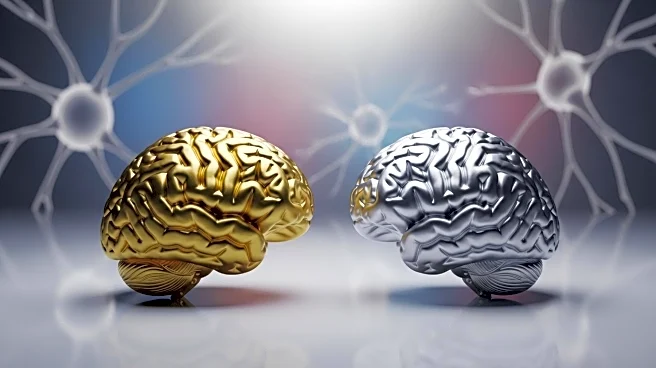What's Happening?
A recent study published in the American Psychological Association's Journal of Personality and Social Psychology suggests that individuals with extreme political views, whether liberal or conservative, exhibit similar neural processing patterns. The study, titled 'Politically Extreme Individuals Exhibit Similar Neural Processing Despite Ideological Differences,' involved testing the brains of 43 participants with varying degrees of ideological extremity. These participants were selected from a pool of 360 individuals and underwent a series of neurophysiological tests, including watching a segment of the 2016 vice-presidential debate between Tim Kaine and Mike Pence. The research found that people with extreme views showed heightened neural activity in brain regions associated with affective processing, such as the amygdala and posterior superior temporal sulcus, when exposed to politically charged content.
Why It's Important?
The findings of this study have significant implications for understanding political polarization. By revealing that extreme political beliefs are processed similarly in the brain, the study suggests that the intensity of belief, rather than the specific ideology, influences how political information is perceived. This insight could foster greater empathy and reduce dehumanization across political divides, as it highlights a shared cognitive experience among those with extreme views. The study's co-author, Oriel FeldmanHall, emphasized the potential for these findings to encourage empathy and understanding, which are crucial for bridging political divides and fostering constructive dialogue.
What's Next?
The study opens avenues for further research into how these neural processing similarities can be leveraged to reduce political polarization. Future studies might explore interventions that could mitigate the emotional reactivity associated with extreme political beliefs, potentially leading to more moderate and open-minded political discourse. Additionally, these findings could inform public policy and educational programs aimed at promoting political tolerance and understanding.
Beyond the Headlines
The study also raises ethical and cultural questions about the role of media and political rhetoric in shaping extreme political views. Understanding the neural basis of political extremity could lead to discussions about the responsibility of media outlets and political leaders in moderating their language to avoid exacerbating polarization. Furthermore, the study's methodology, which involved analyzing brain activity in response to political content, highlights the growing intersection of neuroscience and political science, offering new tools for understanding complex social phenomena.










